High-level evidence on the impact of hearing loss is critical to informing how we prioritize hearing care.
This evidence is crucial for bringing about policy and business changes that would increase the supply and availability of hearing care services and technologies in the marketplace. This evidence is also needed to convert consumer need for hearing care into actual consumer demand, which can help move the needle on updating health care polices around hearing care.
Yet hearing has not been routinely considered in epidemiological and health economic studies, and population health methods for hearing assessment and analysis are often flawed.
Cochlear Center researchers aim to develop robust population health evidence about hearing loss through Center-led research and by including hearing in population health studies underway worldwide, using established methodologies for hearing measurement and analysis.
-
We are leading research and clinical trials like the ACHIEVE study
ACHIEVE is a large-scale randomized trial sponsored by the National Institute on Aging that studied nearly 1,000 adults in their 70s and early 80s with mild-to-moderate hearing loss. The study found that in older adults at increased risk for cognitive decline, hearing intervention slowed down loss of thinking and memory abilities by 48% over 3 years. The ACHIEVE study also looks at other health outcomes, including mental health and well-being, physical function, and health care use, and those results will be published over time.
Visit www.ACHIEVEstudy.org to learn more.
-
We are working to include hearing in population health around the world
Through the Audiology Core, led by Nicholas Reed, the Cochlear Center is bolstering the inclusion of hearing assessment and analytic protocols in population health studies around the globe. This includes disseminating analytic methods, developing customized protocols, training staff, and collaborating with study investigators around the world to incorporate hearing testing into their studies.
Visit Audiology Core to learn more.



